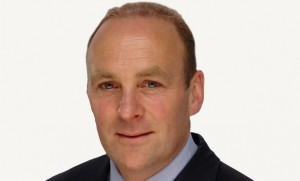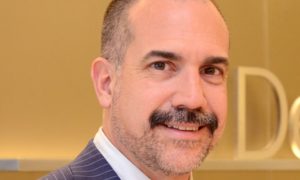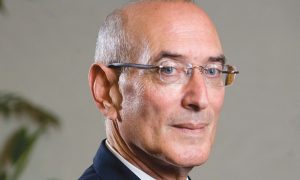Disputes without borders: the law firms dominating the elite game of international litigation
A&O, Cleary, Quinn Emanuel and Dechert on the unique challenges of truly international litigation
October 06, 2017 at 05:04 AM
13 minute read
Some call it 'three-dimensional chess', and it's a game of strategy that lawyers with expertise in competition, fraud, corruption, insolvency and other areas may find themselves playing more often these days, as litigation matters proceed in multiple countries at once.
But not everyone can play at the highest level. While many large law firms now have offices all over the world map, it takes a special set of lawyering and project coordination skills to be able to handle a piece of truly international litigation, according to lawyers who have spent years in the arena.
A cadre of firms that includes Cleary Gottlieb Steen & Hamilton, Dechert, Allen & Overy (A&O) and Kobre & Kim have devoted resources to building up their capacity to handle cross-border litigation matters; lawyers at some of those heavy hitters also point to Debevoise & Plimpton as having a strong global litigation group. Also in the mix is Quinn Emanuel Urquhart & Sullivan, a firm that does a majority of its work on the defence side, but also has a plaintiffs-side practice willing to take on the world's largest financial institutions. And, increasingly, firms such as Hausfeld, which focuses exclusively on plaintiffs side litigation, are looking abroad to expand offices and take advantage of recent plaintiffs-friendly reforms in the UK and European Union.
Different situations can give rise to international, or multijurisdictional litigation – matters marked by a dispute or crackdown on conduct that has effects in multiple countries. But often, they start with a government regulatory investigation and spiral out from there.
Take, for instance, the allegations that some of the world's largest financial institutions conspired to manipulate the foreign exchange markets. The forex scandal prompted investigations and regulatory fines in the US, UK and Switzerland, plus a private class action in US courts that plaintiffs lawyers later looked to replicate in the UK. And much of the action happened concurrently, albeit with pieces of the litigation and regulatory enforcement heating up in different places at different times.
That, in turn, kept a lot of lawyers busy. The banks embroiled in the investigation turned to firms such as Cleary, which represented Citigroup; Sullivan & Cromwell, which worked for Barclays; and Skadden Arps Slate Meagher & Flom, which represented JPMorgan.
 "These are increasingly the scenarios that we're seeing," says John Quinn (pictured), founding partner of litigation powerhouse Quinn Emanuel. His firm sought a lead plaintiffs counsel role to challenge the banks in a US class action over the forex scandal, and although it lost out to Hausfeld LLP and Scott + Scott, Quinn Emanuel is now actively seeking European clients for a similar case abroad.
"These are increasingly the scenarios that we're seeing," says John Quinn (pictured), founding partner of litigation powerhouse Quinn Emanuel. His firm sought a lead plaintiffs counsel role to challenge the banks in a US class action over the forex scandal, and although it lost out to Hausfeld LLP and Scott + Scott, Quinn Emanuel is now actively seeking European clients for a similar case abroad.
Quinn and other lawyers with experience in international litigation say there is a growing need for the specialty, driven in part by increased activity among regulatory agencies in the US, UK, Europe, Asia and elsewhere. Those enforcement actions tend to lead to private disputes, which are increasingly finding their way into courts outside of the US. Meanwhile, there has also been rapid globalisation of businesses and reductions in trading barriers, according to lawyers who practise in the space.
"As much as we thought, 30 years ago, 'the world is shrinking' – it has now shrunk," says Lawrence Friedman, a litigation partner at Cleary.
 Responses from regulators and lawmakers over the past decade or so to the global financial crisis have likely added to the rise in litigation playing out internationally, says Tim House (pictured), head of A&O's global disputes practice.
Responses from regulators and lawmakers over the past decade or so to the global financial crisis have likely added to the rise in litigation playing out internationally, says Tim House (pictured), head of A&O's global disputes practice.
"I just think the world has concentrated more on business integrity issues," he says. "Those, by their very nature, are cross-border."
With several litigators describing an uptick in international litigation matters, it is not surprising that at least some law firms have focused on building the capability to effectively manage these types of cases for corporate clients. What it takes to develop such an expertise is a set of unique skills, having people on the ground in the right places and maintaining the kind of partnership that guards against tribalism within a firm, according to several lawyers in international litigation practices.
For starters, firms have to disabuse themselves of the idea that litigation is the same regardless of the venue, says Cleary's Friedman. It takes much more, he says, than overcoming basic logistical challenges, such as an overseas client in a different time zone who needs to jump on a conference call at off hours. While many lawyers could figure out how to work through those issues, there are not as many steeped in the more critical challenges, such as navigating cultural barriers.
You're helping the courts make this up as they're going. This is brand new law, brand new procedures
Friedman's partner Victor Hou adds that it is not just clients that need guidance. The same can be true of judges, who may be dealing with novel questions about the interplay between laws from different countries. Cleary was among the firms that learned those lessons first hand in the massive Nortel Networks bankruptcy. That case included a first-of-its-kind trial – held simultaneously in Delaware federal bankruptcy court and a court in Ontario, Canada by way of a video feed – to determine how to divvy up more than $7bn raised by selling off Nortel's assets. Working on that trial involved an intense level of coordination and a willingness by multiple parties to proceed in an unusual forum, according to Cleary lawyers.
"You have to be creative and flexible because you're helping the courts make this up as they're going," says Hou. "This is brand new law, brand new procedures."
Beyond inventive lawyering, firms also have to put resources on the ground in key markets. There is not an exact formula for where to have offices, but some markets stand out as critical jurisdictions in which to have local teams.
 "I think it would be very difficult to do it effectively without having a team in London that can do this, and, to almost the same extent, I think it would be very difficult without having a team in New York," says Dennis Hranitzky (pictured), co-head of Dechert's international and insolvency litigation group. "Most of these cases involve litigation in one or both of those places, among other places."
"I think it would be very difficult to do it effectively without having a team in London that can do this, and, to almost the same extent, I think it would be very difficult without having a team in New York," says Dennis Hranitzky (pictured), co-head of Dechert's international and insolvency litigation group. "Most of these cases involve litigation in one or both of those places, among other places."
Other international litigators pointed to places such as Hong Kong, which can serve as a hub for working on cases with implications elsewhere in Asia. Firms looking to do antitrust work internationally would also want to consider a presence in Brussels, the home city of the EU's competition watchdog, says Quinn.
But of course, as Quinn, Hranitzky and others recognise, no firm is likely to have an office in every single jurisdiction that might impact a given client's case. In those situations, the best international litigation firms typically have a network of local firms that they have worked hard to build and maintain relationships with. Where a firm does not have an office of its own, says Hranitzky, "It is absolutely critical that you have deep, highly functional relationships with lawyers in those places that know how to do this."
For its part, Cleary, which often represents Argentinian public and private sector clients, has an office in Buenos Aires, but the firm has also worked to establish partnerships with local lawyers in South America, according to Friedman. That effort, he says, has involved secondments in which foreign lawyers will practice at Cleary for a time – and, as a result, many of the leading local litigators have either passed through Cleary or know the firm's reputation.
Any firm that wants a strong international litigation practice also has to focus on strong cohesion within its own partnership. Because they take place at several locations simultaneously, cross-border cases are often more complex than typical domestic litigation. Reaching a strong result, then, becomes about managing those complexities to ensure the strategy for a given case plays out in the correct sequence. A firm whose partners cannot work well across offices is going to run into trouble.
Several international litigators described a cohesive partnership – one free of turf wars that might cause lawyers in one office to try to hoard more work for themselves – as perhaps the most important aspect of having a successful international litigation practice.
A&O's House suggests that maintaining a single profit pool for a firm's partners, regardless of which office they're in, is one way to ensure the type of cohesiveness that amounts to a strong international litigation practice. "I don't think it's any more complicated than not creating any economic incentive for a partner, or an office or a team, unnaturally to hold work in their hands when it could be better done to the client's advantage by somebody else," he says.
The leaders of Kobre & Kim, which focuses on international disputes involving allegations of fraud, strike a similar chord in describing their approach.
"You need a team in each jurisdiction, but then you need the firm to be unified enough," says Michael Kim, a founding partner of the international litigation firm. His partner Steven Kobre adds: "Implicit in that is a firm that's managed in such a way that people are incentivised to follow whatever lead the case takes you."
Their firm maintains a single-tier partnership and, unlike many other players in the global litigation realm, Kobre & Kim has lawyers stationed in offshore jurisdictions like the British Virgin Islands and Cayman Islands – something that can come in handy if, say, a client needs a lawyer in Hong Kong but is going up against a BVI-registered company, says Kim.
While some large defence firms have built up international litigation expertise – along with the skills, networks and cohesive partnerships that contribute to a successful practice in the arena – counterparts on the plaintiffs side are also now looking outside the US. Firms with a plaintiffs-side practice, such as Quinn Emanuel and Hausfeld, have taken steps in recent years to expand their presence abroad.
Quinn Emanuel, which does a mix of litigation on both sides, has more than a dozen international offices in the UK, EU, Southeast Asia and Australia, and has expanded its Brussels office with three competition partners hired within less than a year. Hausfeld, which focuses more exclusively on representing plaintiffs, has had an office in London since the firm's founding in 2008, and has since opened an office in Brussels, as well as two German outposts in Berlin and Duesseldorf.
At least in part, firms with plaintiffs-side practices have looked to expand international offices to take advantage of recent reforms in the UK and European Union that have opened the door to more collective or group actions – cases that come close to resembling American-style class actions.
In connection with the forex scandal, for example, at least three firms – Quinn Emanuel, Hausfeld and plaintiffs firm Scott + Scott, which opened its first international office in London in 2015 – have been seeking out institutional investors and others who might have claims against banks involved in the market manipulation. Quinn Emanuel has reportedly been advising investment management heavyweight BlackRock and hedge fund BlueCrest Capital Management on a global strategy that would involve bringing suit against several banks in London and likely opting out of being a class member in the US litigation. Scott + Scott, meanwhile, has reportedly signed up a group of claimants to take on Deutsche Bank in the UK.
You've got to educate the parliamentarians; you've got to educate the judiciary - and then you've got to educate the public
With some plaintiffs firms ramping up outside the US, it seems to raise the possibility of a global litigation arms race, pitting heavy-hitters from American litigation against each other in new countries. But international litigators on both sides say that has not happened so far.
"In terms of overall volume, it has not been that significant," says Kim of Kobre & Kim, explaining that there is still a relatively small number of group and collective actions in some of the key markets outside the US.
Part of the reason for the low volume of mass actions is that for a plaintiffs firm – just as on the defence side – building a successful international litigation practice is a complex endeavour. Hausfeld did not just open international offices and start filing lawsuits, Michael Hausfeld says.
Instead, its lawyers, have devoted time and significant energy in the UK and Europe to building relationships with local lawyers, lawmakers and judges. The goal, says Hausfeld, was to share information with key constituencies that have a stake in shaping and taking advantage of changes that allow aggrieved investors and consumers to pursue litigation collectively outside the US.
 "You've got to educate the parliamentarians; you've got to educate the judiciary," Hausfeld (pictured) says. "Then you've got to educate the public that they have rights that they can assert and there is no shame in doing so."
"You've got to educate the parliamentarians; you've got to educate the judiciary," Hausfeld (pictured) says. "Then you've got to educate the public that they have rights that they can assert and there is no shame in doing so."
Brian Ratner, the head of Hausfeld's international practice, adds that it's not enough to simply take a model that works in the US and transplant it to the UK or EU. For Hausfeld, he says, "it was about working within the European system, both running cases and litigating and at the same time working within the European legal circles to develop a reputation."
Recognising the unique challenges of litigating across borders, there have been suggestions that Chambers & Partners should create a new ranking category to encapsulate the practice. And the Legal 500 has created such a category, with Cleary, Debevoise, Dechert and Gibson Dunn & Crutcher listed in the top band. Those specialised rankings go to show what international litigators already know – regardless of which side a lawyer is on, it takes special expertise to make it work.
This content has been archived. It is available through our partners, LexisNexis® and Bloomberg Law.
To view this content, please continue to their sites.
Not a Lexis Subscriber?
Subscribe Now
Not a Bloomberg Law Subscriber?
Subscribe Now
NOT FOR REPRINT
© 2025 ALM Global, LLC, All Rights Reserved. Request academic re-use from www.copyright.com. All other uses, submit a request to [email protected]. For more information visit Asset & Logo Licensing.
You Might Like
View All
KPMG's Bid To Practice Law in US On Hold As Arizona Court Exercises Caution

Combative Arguments at EU's Highest Court Over Google's €4.13B Antitrust Fine Emphasize High Stakes and Invoke Trump
4 minute read
Law Firms 'Struggling' With Partner Pay Segmentation, as Top Rainmakers Bring In More Revenue
5 minute readTrending Stories
Who Got The Work
J. Brugh Lower of Gibbons has entered an appearance for industrial equipment supplier Devco Corporation in a pending trademark infringement lawsuit. The suit, accusing the defendant of selling knock-off Graco products, was filed Dec. 18 in New Jersey District Court by Rivkin Radler on behalf of Graco Inc. and Graco Minnesota. The case, assigned to U.S. District Judge Zahid N. Quraishi, is 3:24-cv-11294, Graco Inc. et al v. Devco Corporation.
Who Got The Work
Rebecca Maller-Stein and Kent A. Yalowitz of Arnold & Porter Kaye Scholer have entered their appearances for Hanaco Venture Capital and its executives, Lior Prosor and David Frankel, in a pending securities lawsuit. The action, filed on Dec. 24 in New York Southern District Court by Zell, Aron & Co. on behalf of Goldeneye Advisors, accuses the defendants of negligently and fraudulently managing the plaintiff's $1 million investment. The case, assigned to U.S. District Judge Vernon S. Broderick, is 1:24-cv-09918, Goldeneye Advisors, LLC v. Hanaco Venture Capital, Ltd. et al.
Who Got The Work
Attorneys from A&O Shearman has stepped in as defense counsel for Toronto-Dominion Bank and other defendants in a pending securities class action. The suit, filed Dec. 11 in New York Southern District Court by Bleichmar Fonti & Auld, accuses the defendants of concealing the bank's 'pervasive' deficiencies in regards to its compliance with the Bank Secrecy Act and the quality of its anti-money laundering controls. The case, assigned to U.S. District Judge Arun Subramanian, is 1:24-cv-09445, Gonzalez v. The Toronto-Dominion Bank et al.
Who Got The Work
Crown Castle International, a Pennsylvania company providing shared communications infrastructure, has turned to Luke D. Wolf of Gordon Rees Scully Mansukhani to fend off a pending breach-of-contract lawsuit. The court action, filed Nov. 25 in Michigan Eastern District Court by Hooper Hathaway PC on behalf of The Town Residences LLC, accuses Crown Castle of failing to transfer approximately $30,000 in utility payments from T-Mobile in breach of a roof-top lease and assignment agreement. The case, assigned to U.S. District Judge Susan K. Declercq, is 2:24-cv-13131, The Town Residences LLC v. T-Mobile US, Inc. et al.
Who Got The Work
Wilfred P. Coronato and Daniel M. Schwartz of McCarter & English have stepped in as defense counsel to Electrolux Home Products Inc. in a pending product liability lawsuit. The court action, filed Nov. 26 in New York Eastern District Court by Poulos Lopiccolo PC and Nagel Rice LLP on behalf of David Stern, alleges that the defendant's refrigerators’ drawers and shelving repeatedly break and fall apart within months after purchase. The case, assigned to U.S. District Judge Joan M. Azrack, is 2:24-cv-08204, Stern v. Electrolux Home Products, Inc.
Featured Firms
Law Offices of Gary Martin Hays & Associates, P.C.
(470) 294-1674
Law Offices of Mark E. Salomone
(857) 444-6468
Smith & Hassler
(713) 739-1250










